
Contrary to popular belief, late-career physicians are often not in a hurry to retire. This is just one of the findings from a 2024 CHG Healthcare survey of late-career physicians completed in partnership with Hanover Research. The survey also found that, overall, late-career physicians are satisfied with their careers, but they also face unique challenges as they approach retirement age.
Career satisfaction grows as physicians age
A survey from the American Medical Association found that job satisfaction among physicians has improved in recent years, growing from 68% in 2022 to 72.1% in 2023. However, the new CHG survey found that late-career physicians are even happier in their careers: 85% expressed satisfaction, with 71% indicating their satisfaction has actually increased over the years.
Late-career physician satisfaction with career
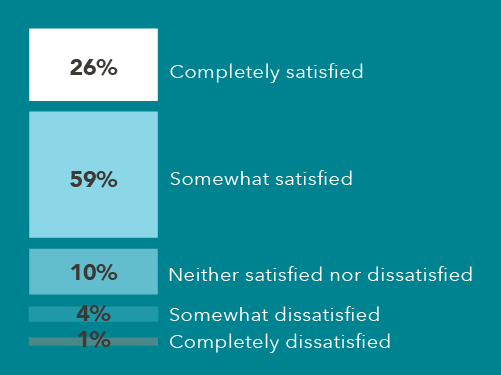
Change in satisfaction relative to beginning career
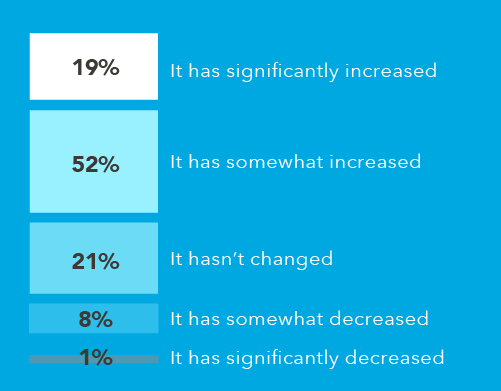
Late-career physicians are not so eager to retire
Many late-career physicians say they aren’t in a hurry to fully retire. Only 18% strongly agreed that they are excited to retire. In fact, physicians 55+ were less likely to look forward to retirement than physicians aged 45 – 54 (63% vs 80%), which suggests that the desire to retire goes down as physicians get closer to retirement age.
Physicians’ agreement with the statement: “I am excited about the prospect of full retirement”
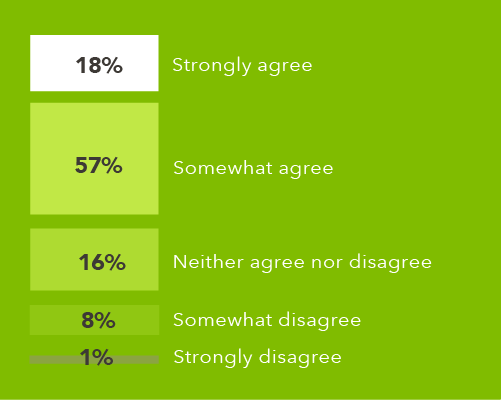
Similarly, the average age physicians are considering retiring changes as they age. Physicians aged 45 – 54 were 84% (+31pp) more likely to think they would retire before 65. Meanwhile, physicians aged 55+ were more likely to say they would retire later than 65 (40%).
Late-career physicians’ anticipated retirement age (by age group)
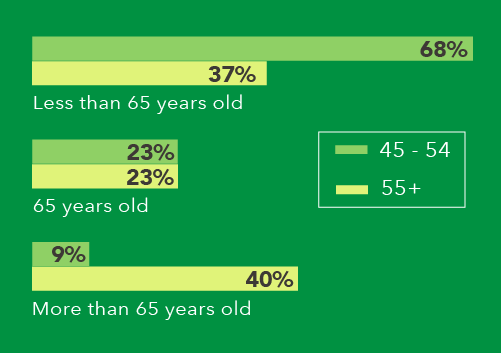
Compensation is not a top motivator for late-career physicians
Because late-career physicians enjoy practicing more, many want to continue working after retirement age. When asked about their plans, the top reasons most physicians say they want to continue practicing are their enjoyment of practicing medicine and the social dynamic of the work environment (58% and 57%, respectively). Although financial concerns were cited as a factor for some physicians, money is not one of the top reasons late-career physicians consider delaying retirement.
Late-career physician reasons for practicing medicine beyond 65
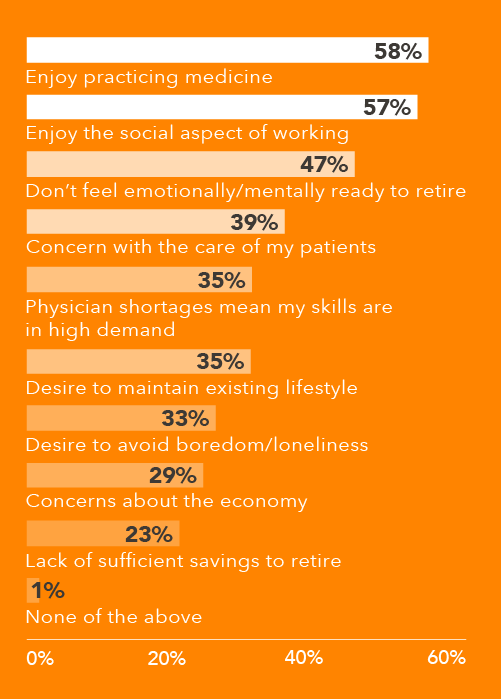
Challenges for late-career physicians
Although late-career physicians have abundant experience, they also face unique challenges that prevent some from practicing as long as they would like to. According to the survey, top professional challenges included navigating health insurance complexities (45%) and adapting to new technologies in healthcare (43%).
Current professional challenges of late-career physicians
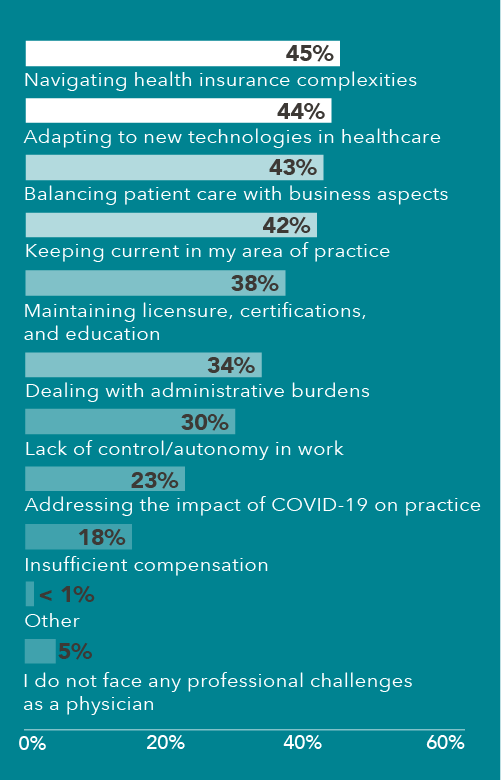
Personal challenges, however, are also a limiting factor for late-career physicians. About half (49%) cite maintaining physical stamina for long hours and declining personal health (42%) as their top personal challenges.
Current personal challenges of late-career physicians
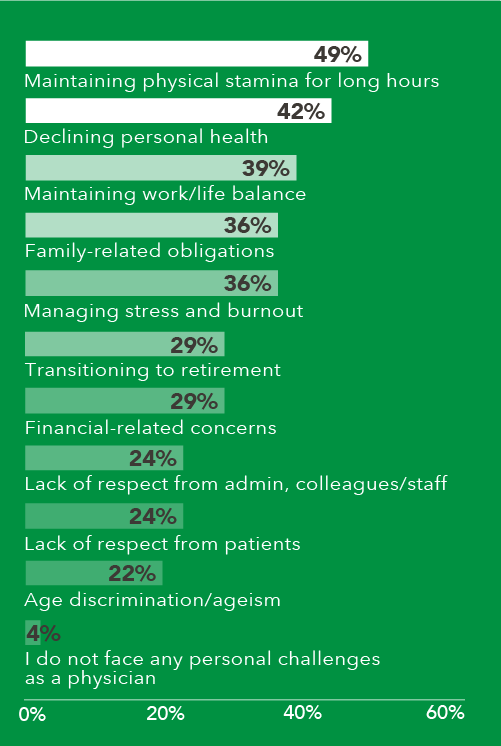
Opportunities to address the challenges of late-career physicians
As late-career physicians age with the general population, there may be opportunities to reconcile the reality of their physical limitations with their desire to continue practicing medicine. Although late-career physicians are often perceived as being slow to adapt to new technologies and/or less interested in delivering care virtually, survey results indicate otherwise. Nearly nine in 10 late-career physicians (89%) indicated they are currently working in telehealth or have worked it in the past.
Late-career physicians’ experience providing telehealth services
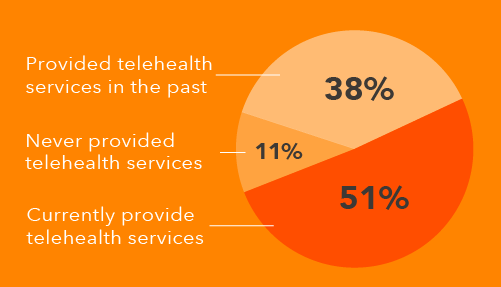
Of those who do not currently provide telehealth services and are not retired, 73% indicated they would be “very” or “extremely interested” in doing so in the future.
Late-career physicians’ interest in providing telehealth services
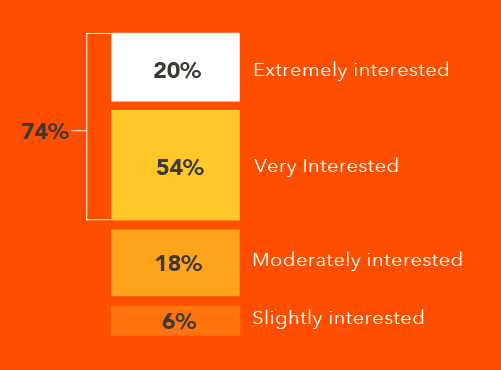
These results suggest that late-career physicians are more open to alternative forms of care, such as telehealth, locum tenens, or a hybrid of both than is often assumed. Many are still eager to continue practicing medicine and may be attracted by the flexibility and control over their schedule that telehealth and locum tenens work provide.
Trends in telehealth: Integrating physicians into virtual care
Opportunities to meet the needs of late-career physicians
Employers seeking to retain late-career physicians may be more successful by adjusting workload and promoting a better work/life balance.
Work/life balance
When asked what they would have done differently in their careers, roughly half (54%) of late-career physicians indicated they wished they had maintained a better work/life balance. Money-related factors like saving for retirement or establishing additional income streams were secondary drivers.
Late-career physicians’ desired knowledge and actions in early career
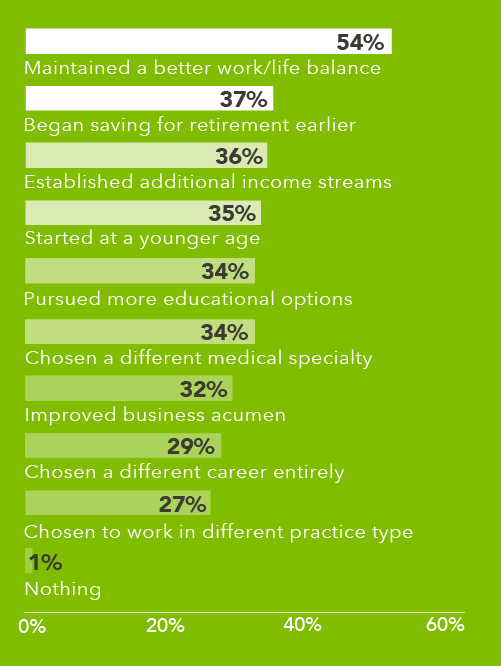
Workload preferences
This desire for better work/life balance is reflected in their workload preferences. A majority of late-career physicians work more than they want to. Three-quarters (77%) said they would prefer to work 21 – 40 hours a week, but half work more than 40 hours a week (51%).
Actual vs. preferred hours worked of late-career physicians
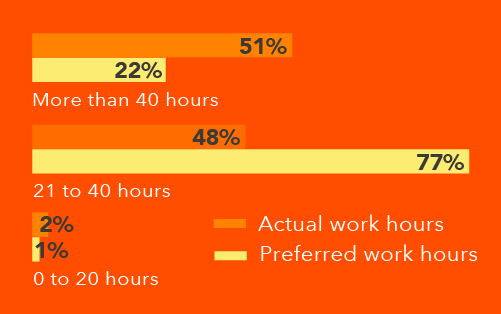
Retirement planning for late-career physicians
When asked about what they are doing to prepare for retirement, again, money and financial investments were not the highest priority. About half (45%) had discussed plans with family and friends. Interestingly, only 35% have invested through employer-sponsored benefits or met with a personal financial advisor (33%).
Steps taken towards retirement
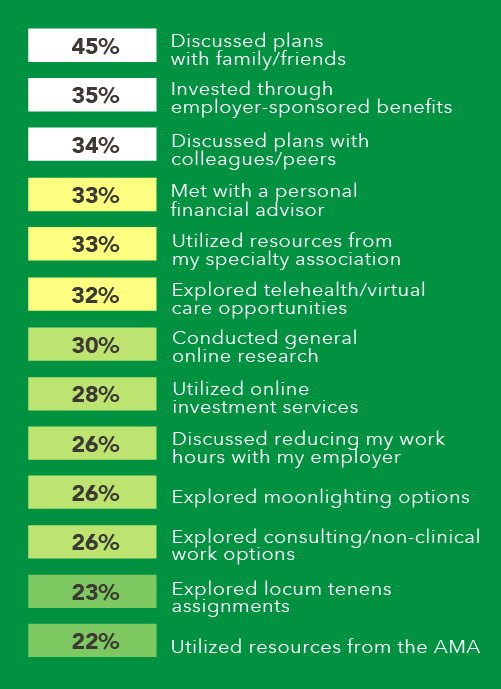
Locum tenens as a transition-to-retirement strategy
Because late-career physicians express a strong desire for greater work/life balance, locum tenens is an attractive option as a way to transition into retirement.
The survey found that 94% of late-career physicians have at least a slight interest in working locum tenens, while 54% are very or extremely interested.
Interest in working locum tenens as a bridge to retirement
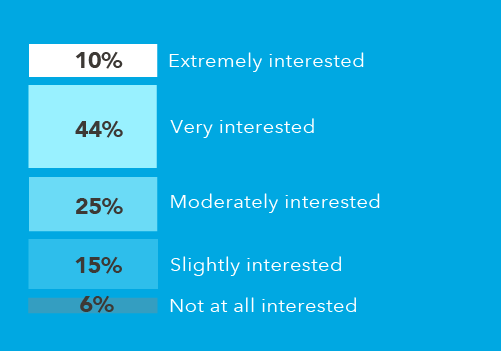
Like telehealth, locum tenens gives physicians greater control over their schedule — how often and how much they want to work after leaving full-time practice. This can be especially appealing considering that most physicians (94%) intend to keep their license active after leaving full-time practice, with nearly half (48%) planning on keeping it for at least three years.
Years keeping medical license active post full-time practice
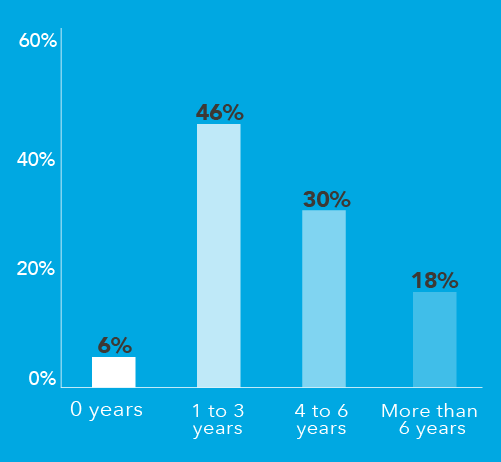
Helping late-career physicians adapt their careers to their needs
While adapting to new technologies and declining personal health pose real challenges for many late-career physicians, high job satisfaction and their love of medicine motivate many to keep practicing well beyond retirement age. Alternative ways of practicing, like telehealth and locum tenens, are attractive options that can keep many physicians in the workforce while providing a gradual transition to full retirement.
Methodology
Hanover Research, in collaboration with CHG Healthcare, polled more than 400 physicians aged 45 and older who were currently practicing medicine (full time or part time) in the United States or recently retired (partially or fully from practice) within the past three years. Physicians who responded to the survey are considered “late career,” meaning they have at least 21 years of experience practicing medicine.
Download the executive summary:
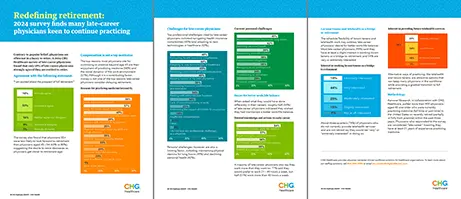
CHG Healthcare provides physician-centered clinical workforce solutions for healthcare organizations. To learn more about our staffing solutions, call 866.588.5996 or email ecs.contact@chghealthcare.com.